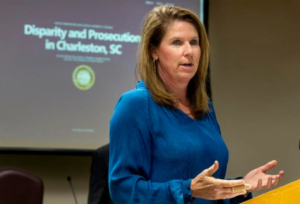Solicitor Objects to Legislature’s Tone-Deaf Judicial Politics
Originally published by Brian Hicks for The Post & Courier
The politicians who brought you the all-male state Supreme Court are getting called out for more juris imprudence.
Just a couple of weeks before the Legislature elects its next slate of male judges.
Ninth Circuit Solicitor Scarlett Wilson says Senate Majority Leader Shane Massey’s recent explanation of why there aren’t more women and minority judges in South Carolina is “ludicrous.”
And, well, he kind of asked for it.
Reporters recently questioned Massey about the lack of judicial diversity in South Carolina, as highlighted by lawmakers’ decision last year to replace the only woman on the state Supreme Court — retiring Justice Kaye Hearn — with a man. Which made South Carolina the only state in the Union with no women on its top court.
Massey’s answer raised a lot of eyebrows … and ire.
“I would prefer to have a court that looks like South Carolina, but I’m not going to vote for somebody who has a worldview that is inconsistent with where I think the state should go,” Massey said.
Massey criticized the state’s law schools and bar association for not better preparing women and African American attorneys to be judges. He later said his remarks were mischaracterized, that he wants to see more qualified women and minorities “want to be judges.”
“But they have to run. They have to want to be judges,” he said. “If we have good candidates, I think we pick good judges.”
Wilson says that is, in a word, malarkey — an attempt to shift the blame from the Legislature’s all-too-political judicial elections. The veteran solicitor says there’s a good reason more minority and women lawyers don’t bother running for judgeships.
“They watch as the goal posts are moved to accommodate the friends and family of legislators while keeping other qualified candidates out,” Wilson says. “And it’s not in the actual election where most shenanigans occur … it’s in the days and weeks leading up to it by the intimidation of candidates to ‘drop out.’”
Last February, the General Assembly elected Appeals Court Judge Gary Hill to replace Hearn on the state Supreme Court, which looked bad to many folks for two reasons:
Justice Hearn had, weeks earlier, written the lead opinion striking down a restrictive abortion law passed by the Legislature. And then, curiously, two women on the Appeals Court running to replace her — both with more experience than Hill — withdrew from the race at the last minute.
Wilson says women candidates are sometimes bullied into dropping out so lawmakers can avoid hard votes (which is what some people allege happened in last year’s election). The solicitor says her issue is not with any judicial candidates, but legislators who use the “worldview” excuse when it’s convenient.
“Unfortunately, we see Massey’s take across political stripes. It’s most disturbing and even more telling when minorities and women who DO share the views of legislators are over-looked or tanked,” Wilson said. “The Republicans have a super-majority, yet some Republicans are currently lobbying against a black moderate candidate in favor of their friend — a white male who happens to be a former legislator, who was a Democrat nominee for governor, who was endorsed by Planned Parenthood and who acknowledges he hasn’t practiced actual law in five years. This sort of thing happens all the time and those who follow judicial elections know ‘worldview’ only matters when legislators want it to.”
In the months since the Hearn replacement controversy, lawmakers — who elect judges from the Supreme Court down to Family Court — have been taking heat over the amount of influence lawyer-legislators have over the judicial screening process. In which a handful of powerful lawmakers decide which candidates are even allowed to stand for a judgeship.
Massey’s comments drew harsh criticism at exactly the worst time from other legislators, past lawmakers, women’s groups and now an influential solicitor.
Wilson says she’s not for quotas, but was astonished by this attempt to shift the blame for a lack of judicial diversity — especially after seeing so many qualified women sidelined by the flawed process.
All this will make the Legislature’s Feb. 7 judicial elections even more interesting. Especially if no one reminds lawmakers the first rule of politics:
When you’re in a hole, the best strategy is to quit digging.
